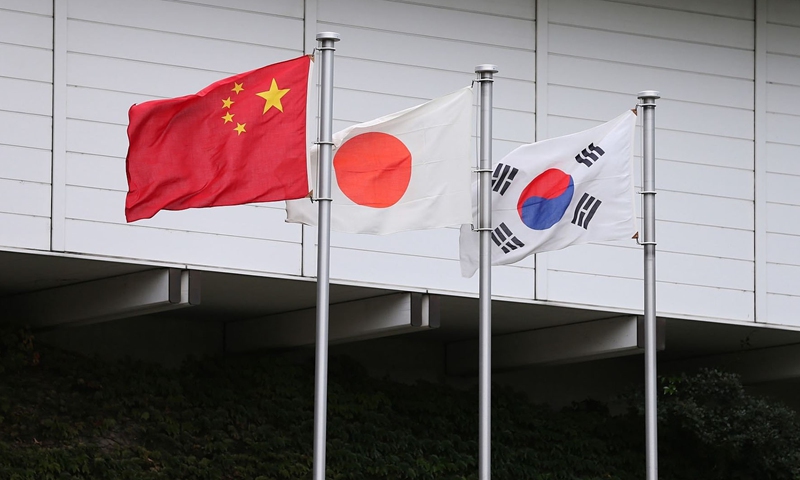China hopes to work with Japan, S.Korea to create conditions for trilateral leaders' meeting: FM spokesperson

Commenting on the possible resumption of China-Japan-South Korea leaders' meeting, a spokesperson for the Chinese Foreign Ministry (FM) said at a Thursday press briefing that China hopes that the three countries will jointly create conditions for the leaders' meeting, and is also ready to maintain communication with the two neighbors for the meeting's preparation.
FM spokesperson Mao Ning made the remarks on Thursday, noting that China attaches importance to the trilateral cooperation.
While expressing anticipation for the potential leaders' meeting, Chinese observers warned that some challenges among the three neighbors and external obstacles coming from Washington could affect its resumption, citing the political crisis facing Japanese Prime Minister Fumio Kishida and the defeat in parliamentary elections of South Korean President Yoon Suk-yeol's ruling party, as well as the deepened aggressive defense ties between the US and Japan.
According to South Korean media outlet KBS World on Wednesday, South Korean Foreign Minister Cho Tae-yul said on Monday that the three nations are coordinating to finalize the date of the next trilateral meeting.
The media outlet noted that regarding the minister's remarks, Seoul's foreign ministry on Tuesday said that the three nations are moving toward an agreement on the schedules of the meeting and added that they are in the final stages of discussions.
The Japan News revealed on Wednesday that the three countries have made final arrangements to hold a trilateral meeting in South Korea in late May, likely on May 26 and 27.
It will be the first such meeting in nearly four and a half years, since a December 2019 meeting in Chengdu, Southwest China's Sichuan Province.
Chinese observers expressed high expectations for the potential leaders' meeting, as they believe that the three neighbors are the locomotive of economic development in Asia and a meeting will further promote mutual beneficial cooperation among them and play a driving role in the regional and global economies.
"Considering this, the three countries all are willing to resume the leaders' meeting in the post-COVID era," Lü Chao, an expert on the Korean Peninsula issue at the Liaoning Academy of Social Sciences, told the Global Times on Thursday.
However, some observers pointed out that there are still some obstacles that need to be overcome before the meeting can be held.
There is a question mark hanging over whether Kishida can maintain his political footing at home when support for his cabinet has been continuously low, with the latest poll showing that the approval rating for the Kishida administration dropped to 23 percent, according to a poll from Japanese media outlet NHK on Monday.
Also, South Korea's ruling People Power Party (PPP) and Yoon's administration were left reeling after a resounding defeat in parliamentary elections.
Given that South Korea is currently the rotating chair of the trilateral dialogue, Yoon is believed to be actively pushing for a resumption of the trilateral meeting, as hosting the meeting in South Korea would enhance the country's international prestige and help Yoon politically, Lü said.
But observers noted that the electoral drubbing may have turned Yoon into a lame-duck president for his remaining three years in office and it is unclear if this would affect the meeting being held at an early date.
More importantly, observers pointed to external interference from Washington as the biggest obstacle.
During Kishida's latest visit to the US, US President Joe Biden and Kishida agreed to bolster their defense ties targeting China, which could exacerbate tensions between Beijing and Tokyo, thus having a negative impact on the smooth holding of the trilateral meeting, Lü believes.
Separately, according to the latest survey conducted by the Global Times Research Center, 53 percent of respondents said the US is "either" or "probably" the main factor hindering friendly relations between China and South Korea.
Observers called on Japan and South Korea to work with China for strengthened cooperation, especially on economy and trade, as the economies of the three countries are highly complementary and interdependent.
If the meeting is held soon, it is expected to promote cooperation in diplomatic coordination, information communication, personnel exchanges, climate change response, and logistics connectivity, Lü said.